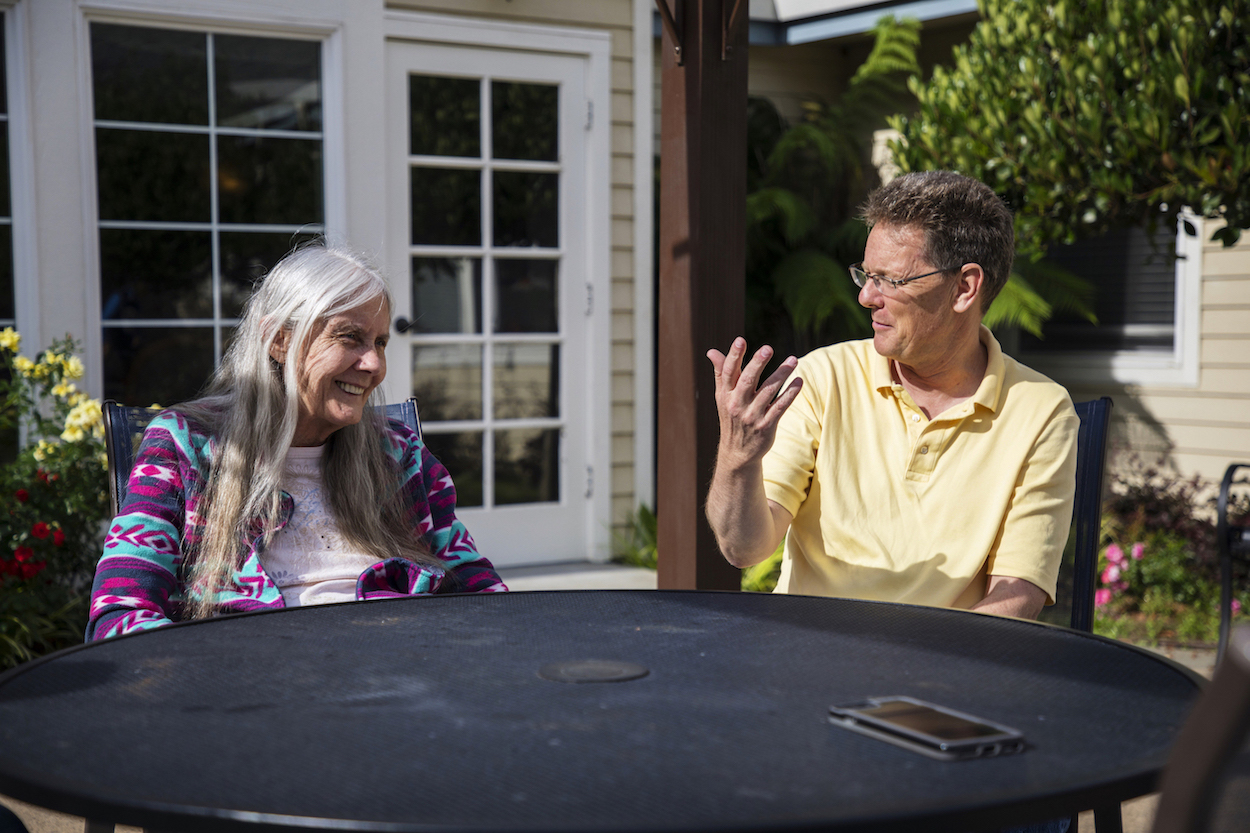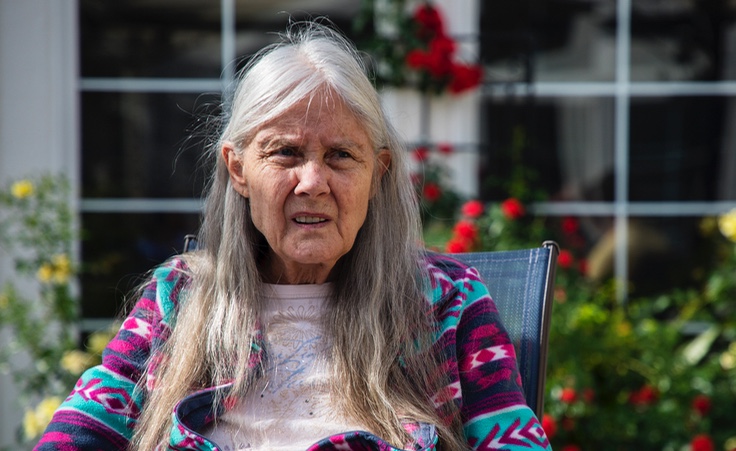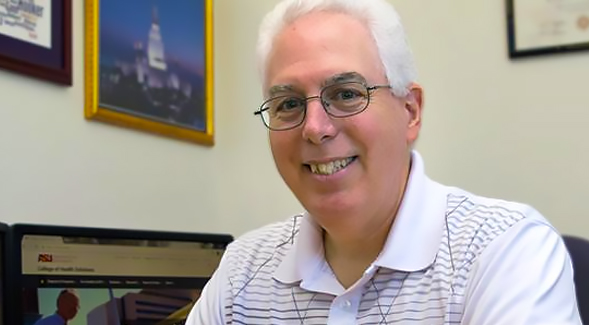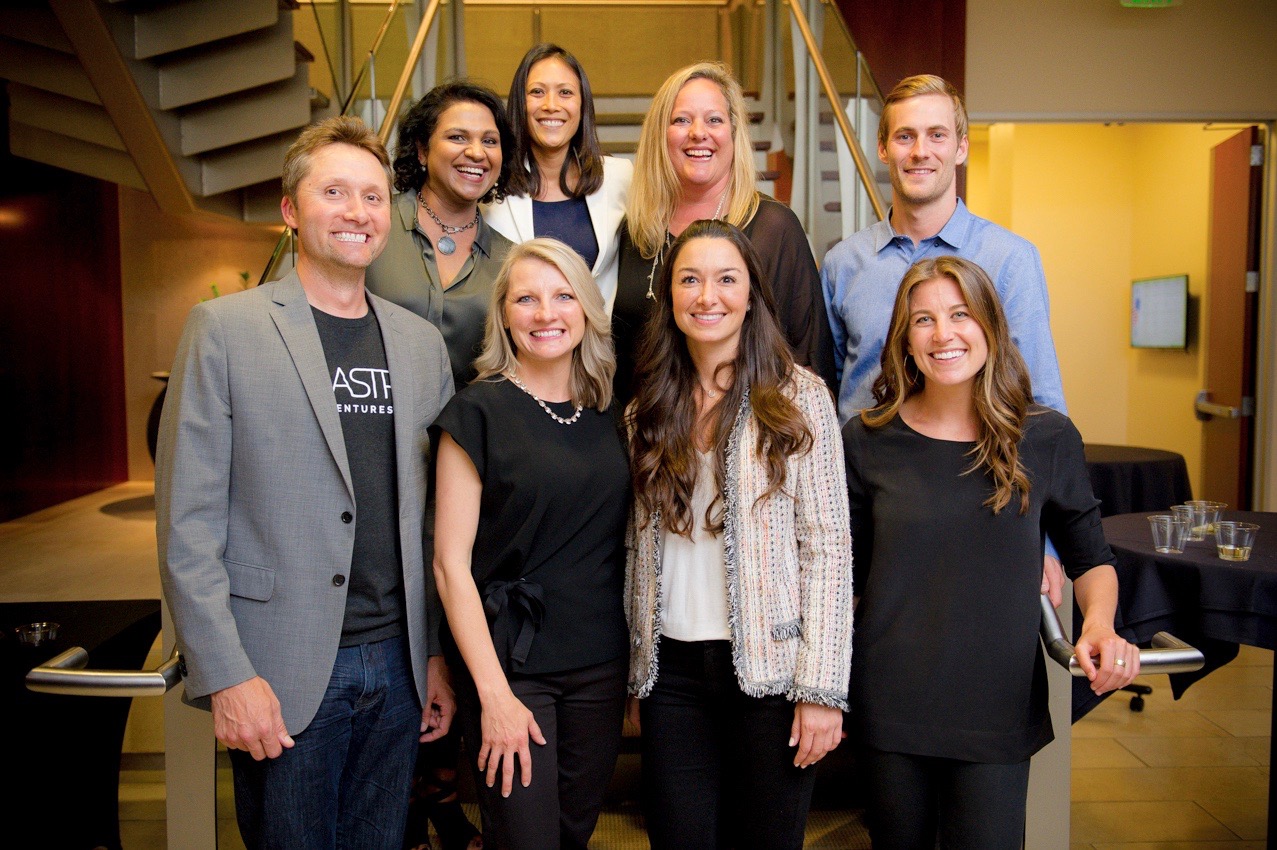Daily Business Report-June 19, 2018
Front row: Eric Gasser, program manager at Ad Astra, Shannon Williams, Jennifer Cosco, Jenna Ryan. Back row: Vidya Dinamani, Allison Long Pettine, Silvia Mah, Spencer Gordon, co-founder of Uqora.
3 female-led companies become 1st
graduates of Ad Astra business accelerator
San Diego companies Uqora, Envy, and ControList have become the first graduates of Ad Astra, a new business accelerator focused on boosting female-led, high-growth companies in San Diego. Each business also received a $20,000 seed investment from Ad Astra’s founders Vidya Dinamani, Allison Long Pettine, and Silvia Mah. Earlier this year, the trio with 30 years of combined business experience launched Ad Astra, which means “to the stars” in Latin.
“We’re on a mission to create new pathways for female-led businesses through educational programming, financial investment opportunities, and support from our global community of mentors and advisers,” says Dinamani, co-founder of Product Rebels.“Our very first cohort of business owners came to us with proven, revenue-generating businesses, and they’re leaving with greater wisdom and a deeper connection to San Diego’s rich business community.”
The three women leading these promising businesses are:
Jenna Ryan of Uqora – This powdered drink mix with hints of pink lemonade has the potential to prevent urinary tract infections (UTIs), the second-most common infection experienced in the United States. A 10-pack of five-star-rated Uqora drink mix is $30.
Jennifer Cosco of Envy – Touting the content depth of Yelp with the visual ease of Instagram, Envy is a location-based search engine with familiar swipe-right, swipe-left functionality that allows consumers to search for products and services in a visually enticing way.
Shannon Williams of ControList – This software platform was created by compliance experts for law firms and networks in the debt recovery industry. ControList allows businesses to access real-time reporting and to track, assign, and complete internal and client-related tasks and controls to maintain compliance and identify issues before they arise through a client’s audit.
“These entrepreneurs are fierce, smart and on the verge of something even bigger,” adds Mah, executive director of Hera Labs.“Ad Astra has transformed their businesses and lives by providing each of them with customized formulas for success.”
More than 150 supporters, fellow startups and funding experts joined the founders to celebrate their success at Ad Astra’s Demo Day on May 30. During the evening event held at AMN Healthcare in San Diego, each founder shared the evolution of their businesses.
“Now at program completion, each founder is walking away with an even strong understanding of their unique leadership style, which will drive their business plan and strategy,” says Pettine, founding partner of Seed San Diego. “We’re proud of our first cohort and look forward to launching additional programs through Ad Astra Ventures.”
Those interested in applying for the next 12-week program, which begins in September 2018, can do so at adastra.ventures/application/.
__________________

California’s expanding care options
for Boomers with dementia —
but still falling short of the need
By David Gorn | CALmatters
Rob Lyman of Redwood City didn’t know what to do. He was helping his aunt, Sharron Evans, who had early-onset Alzheimer’s disease and needed constant supervision. A former teacher, she had run out of money and had no income.
She qualified for government health care assistance, but it appeared she’d have to go to the only setting that would be covered: a nursing home.
“Basically that’s a hospital setting, and that was our only choice,” Lyman said. To him, that didn’t make sense.
“My aunt just needed a safe place to be; there was nothing physically wrong with her,” Lyman said. “She didn’t need that level of care. It’s inappropriate. It costs the state a lot of money. But this is what people do. That’s the default choice.”

The Baby Boomers are aging. By the end of the next decade, 11.1 million Californians will be 60 or older, and the number of people 85 and over will jump 37 percent, to the 1 million mark, according to state officials. One in six Americans is expected to develop dementia, and care can be expensive enough to force even middle-class families into poverty and onto the public payroll.
For low-income seniors who can’t afford care at home and don’t want or need the full medical services of a nursing facility, the state’s few options aren’t enough to meet demand. A middle-ground choice — assisted living —requires special permission under government rules and is available to fewer than 4,000 Californians, although state health officials and lawmakers are both proposing increases. Taxpayers currently pick up the more expensive nursing-home tab for more than 20,000 people who may not need it, by one advocate’s estimate.
Evans, now 69, was lucky enough to land a permitted spot in a Sacramento-area assisted-living home after nearly a year’s wait. The cost didn’t matter much to her or Lyman because it was paid by Medi-Cal, the state’s version of the federal Medicaid program for the poor. The lower price tag for assisted living saves the state money, while also providing a more home-like setting and the right level of care.
For more than a decade, the state Department of Health Care Services has been trying to address the need for more appropriate, less costly care. But Medicaid pays only for what is “medically necessary,” such as nursing-home care, unless states ask for waivers. The state budget deal struck recently would provide administrative costs for a waiver to cover an additional 2,000 assisted-living slots.
That’s not enough, said Assemblyman Ash Kalra, a Democrat from San Jose. Kalra proposesadding nearly 13,000 more, to cover a total of 18,500 people over the next five years. That would basically triple the number of Medi-Cal recipients with access to assisted-living care, assuming waivers, which last five years, can be secured.
“We’re hitting a crisis point with our senior care,” Kalra said. “It costs us twice as much for skilled nursing care.” His bill, which has no opposition, passed the Assembly and is now in the Senate.
The federal and state governments each pay roughly half of Medi-Cal expenses. A legislative staffer pegged savings for the state’s share at slightly more than $23 million over the five years, once all 18,500 patients are placed in assisted living. According to the Department of Health Care Services, which oversees Medi-Cal, the state’s share of the average cost for assisted living is about $22,000 a year per person, roughly half the $42,000 annual cost of a nursing-home.
“I have visited skilled-nursing facilities, and the nurses … told me that many of the patients don’t need that level of care. So we could be saving money for the state dramatically,” Kalra said.
According to the Department of Health Care Services, California has about 53,000 Medi-Cal patients in long-term institutional care, such as skilled-nursing facilities. A legislative analysis shows an estimated11,000 of them have lower-care needs and could be fine in assisted living.
That figure could actually be twice as high, said Mark Cimino, who runs assisted-living homes in the Bay Area and around Sacramento, including the one where Evans lives. He said assisted-living facilities provide a wide range of care that could serve upwards of 20,000 Medi-Cal patients who are now in nursing homes.
California’s first waivers, approved in 2004, covered about 1,000 people. That figure doubled in 2009 and nearly doubled again to about 3,700 in the most recent period, which runs out in March 2019.
“There’s a huge trajectory here,” Cimino said. “The question is: Is the expansion of the waivers enough?”
And there’s the human side of the equation, he added: “The assisted-living community is more home-like,” he said. “No one wants to spend much time in a [skilled-nursing] unit.”
The state “has specifically worked to expand access to assisted-living services,” said Department of Health Care Services spokeswoman Carol Sloan.
It’s hard to go any faster, she said by email, because the state has to check for “requirements, monitoring and oversight responsibilities, staffing, adequacy of available provider network and other resource limitations” before requesting more waivers.
As for the nursing-home industry: “If a resident can be shifted to a lower level of care, we think that’s a good thing,” said Deborah Pacyna, spokeswoman for the California Association of Health Facilities, a trade group. “We always support people getting the appropriate level of care for their needs.” That won’t hurt business, she said: “The Boomers are coming.”
For Rob Lyman, a move toward assisted living is a no-brainer.
“If the state, and we as a community, are going to provide assistance, we have to do it in a cost-effective way,” he said. “Putting people in skilled nursing when they don’t need it, that’s not good stewardship of public dollars.”
CALmatters.org is a nonprofit, nonpartisan media venture explaining California policies and politics.
__________________

State honors San Diego City, Mesa and
Miramar Colleges for putting people to work
More than 50 career education programs at San Diego City, Mesa, and Miramar colleges are being recognized by the California Community Colleges Chancellor’s Office for their effectiveness at preparing students for good-paying jobs and boosting their prospects for upward economic mobility.
Among those being honored with a Strong Workforce Star was City College’s Electricity program, where students realized an 84 percent increase in earnings, 100 percent of students are now employed in a job similar to their field of study, and where 87 percent of students are earning the regional living wage; the Animal Health Technology program at Mesa College, where students saw a 166 percent increase in earnings and 100 percent of students are working at a job similar to their field of study; and the Administration of Justice – Law Enforcement Technologies program at Miramar College, in which 92 percent of students are earning the regional living wage and 95 percent of students are employed in a job similar to their field of study.
Workforce Stars is part of the Strong Workforce Program, an annual $200 million investment launched in 2016 to create 1 million additional middle-skilled workers and lift low-wage workers into living-wage jobs
__________________
Online property auction
to feature nearly 700 properties
Bidders who did not get to buy property in San Diego County’s May online auction will now get a second chance. San Diego County Treasurer-Tax Collector Dan McAllister opened bidder registration for the 2018 online reoffer property tax auction, featuring 691 properties.
“We are pleased to give prospective buyers another shot at buying a piece of paradise in beautiful San Diego County,” said McAllister. “Most of the available properties are timeshares — all starting at $100 — so we want to encourage people across the country to take advantage of these great deals.”
Those who wish to participate must register as a bidder by July 12. To sign up, go to the Treasurer-Tax Collector’s (TTC) tax sale website sdttc.mytaxsale.com and submit a refundable $1,000 deposit, plus a non-refundable $35 processing fee.
The online auction will take place from July 20 to 25, and it will include 655 timeshares, 3 improved properties (homes or businesses), and 33 unimproved properties (land). The available properties were left over from the TTC’s initial auction in May, during which buyers purchased 323 properties for a total of $3,065,400.
__________________

Healthy lifestyles are a focus
for new dean at San Diego State
By Jeff Ristine | SDSU NewsCenter
Physical activity and its benefits in keeping older adults both healthy and mentally sharp is an ongoing research specialty for Steven Hooker, San Diego State University’s new dean of the College of Health and Human Services.
It’s an interest he developed during stints with the California Department of Health Services in Sacramento, where he worked from 1996 to 2003. Hooker was coordinator of an initiative called the California Active Aging Project, aimed at promoting physical activity for those over 50 and implemented in several communities throughout the state.
Currently associate dean of research at Arizona State University’s College of Health Solutions, Hooker officially begins at SDSU on June 29. He takes over for Larry Verity, who has served as interim dean since 2016 and will continue in his position as associate dean of academic affairs.
“It’s an exciting time to be at San Diego State University,” said Hooker. He looks forward with helping to “set the stage for the next 10 to 15 years of success at SDSU.”
__________________
Vertex opens expanded
research site in San Diego
Vertex Pharmaceuticals Inc. announced the opening of its new 170,000- square-foot research facility in San Diego. The new site at 3215 Merryfield Row represents a significant expansion of the C\company’s research presence in the area, and its continued investment in the local economy. The San Diego site is one of Vertex’s three global research hubs, and is where the company’s three breakthrough cystic fibrosis medicines were discovered.
More than 70 percent of the new facility is dedicated to state-of-the-art lab and research space. It features a 1,500-square-foot learning lab for science, technology, engineering, arts and math education programs, expanding on the company’s commitment to inspire and equip the next generation of leaders in science; and a 4,000-square-foot incubator suite for external collaboration.
Construction of the new building was overseen by Alexandria Real Estate. Vertex has committed to a 16-year lease to fully occupy the site.
__________________
Ramona Company Awarded $15.9 million
contract for renovations at Travis AFB
R.A. Burch Construction Co. Inc. in Ramona has been awarded a $15.85 million contract for the renovation of buildings at Travis Air Force Base. The work to be performed provides for renovation and modernization of buildings 250 and 241. The second floor of building 250, bays A and B will be renovated and modernized. The task order also contains one unexercised option and two planned modifications, which if exercised would increase cumulative task order value to $17,989,537. Work will be performed in Fairfield, Calif., and is expected to be completed by December 2019. The Naval Facilities Engineering Command, Southwest in San Diego awarded the contract.
__________________
Vista and Escondido companies
share in $249 million Navy contract
Orion Construction Corp. in Vista and Bilbro Construction Co. Inc. in Escondido have each been awarded contracts by the Naval Facilities Engineering Command, Southwest, San Diego, for new construction, renovation, and repair of various heavy horizontal and civil engineering construction projects at various government installations. The companies are among eight firms awarded contracts totalling $249 million.
__________________

UC San Diego breaks ground on new home for Sixth College
Times of San Diego
UC San Diego broke ground Monday at a 10-acre site that will be the new home for Sixth College on the site of two parking lots on North Torrey Pines Road. The project, expected to be completed in 2020, will include two new academic buildings, a market, dining hall, retail center and dormitories for 2,000 undergraduates. The new buildings will total 1.6 million square feet of space.




